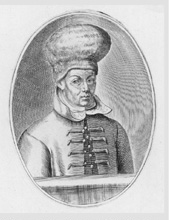The Good, the Bad and the Unready (52 page)
Read The Good, the Bad and the Unready Online
Authors: Robert Easton

 Pretty Witty Nell
Pretty Witty Nell
see
Eleanor the
WITTY
 Rudolph the
Rudolph the
Prince of Alchemy
Rudolph II, Holy Roman Emperor, 1552–1612
Rudolph was prone to severe bouts of depression, and his tactic for dealing with the demands of the external world was to shut himself away in his castle in Prague and literally put his fingers in his ears. This was not the kind of behaviour that his subjects wanted to see in their emperor.
In between his attacks Rudolph was clear-headed, but as the sixteenth century came to a close his periods of lucidity decreased. Eventually he was forced to bow to the inevitable and, entrusting the government of his empire to his ministers, retired to his fortress. Without the worries of office, he was then able to devote himself to the study of alchemy and the search for the Philosopher’s Stone. At his court astrologers, soothsayers, necromancers and mathematicians all attempted to transmute base metals into gold, but to no avail.
In his final years ‘the Prince of Alchemy’ became ever more eccentric, attending Mass in a secret chapel wearing chains, walking about with the fingers of a dead man in his pocket, and collecting dwarves. In the end he went completely mad.
 George the
George the
Prince of Whales
see
Georgethe
BEAU OF PRINCES
Ptolemaic Kings
Beginning with the accession of Ptolemy the Saviour in 323 BC and ending with the death of Cleopatra in 30 BC, the Ptolemaic dynasty is a deeply convoluted and somewhat neglected 300-year stretch of Egyptian history. Nicknames of a few of the earlier Ptolemaic kings reflect the intimate relationships among the Egyptian royal family. Those of the later rulers (whose precise dates and even numerals are keenly disputed) suggest an increasingly feeble monarchy. The first dozen kings are listed below.
Ptolemy I the Saviour
c.367–c.283 BC
The inhabitants of Rhodes supposedly awarded Ptolemy the divine title of ‘Soter’ after his forces saved their island in 304 BC by lifting a year-long siege led by Antigonus the
ONE-EYED
.
Ptolemy II the Brother-Loving
308–246 BC
As well as caring deeply for his brothers, Ptolemy also loved his sister, Arsinoe II. He loved her so much, in fact, that he married her.
Ptolemy III the Benefactor
282–211 BC
Dubbed ‘Euergetes’ because, as well as extending the kingdom almost as far as Babylon, he sponsored learning and the arts and was famed for initiating the construction of a great temple at Edfu.
Ptolemy IV the Lover of His Father
c.238–205 BC
Ptolemy ‘Philopater’ may have loved his dead father, but he had little time for any of his other relatives, not least his mother, whom he assassinated at the inauguration of his reign, and his sister, whom he married and then murdered.
Ptolemy V the Illustrious
c.210–180 BC
Hardly illustrious, Ptolemy ‘Epiphanes’ was controlled by inept guardians when he was a boy-king and incompetent advisers when an adult. As a result, Egypt lost nearly all its foreign possessions during his sorry reign.

Ptolemy the Lover of his Father
Ptolemy VI the Lover of His Mother
c.180–145 BC
Ptolemy VI’s nickname of ‘Philometor’ refers to his role as joint head of state with his mother, Cleopatra I, until her death in 176 BC.
Ptolemy VII the New Lover of His Father
d.144 BC
Sources are muddled as to the place of this king in the Ptolemaic royal sequence. It seems that he ruled some-
time in 145 BC after the death of his father, whom he apparently loved, and later was executed when his widowed mother married his uncle, whom he possibly did not love so much.
Ptolemy VIII the Pot-Bellied
d.116 BC
This Ptolemy wanted to be known as ‘the Benefactor’, but it was not to be. Alexandrians dubbed their brutal king ‘the Malefactor’, especially after his expulsion of all Greek intellectuals from the city, while his more common nickname was ‘Physkon’, meaning ‘the Pot-Bellied’ or ‘Fatso’.
Ptolemy IX the Chickpea
d.81 BC
Although also known as ‘Fatso’, Ptolemy IX was more famously known by the mysterious and intriguing appellation ‘Chickpea’. The Greek essayist and biographer Plutarch states that it was given irreverently. Perhaps, as with the Roman orator Cicero, he was so named because he had a chickpea-shaped wart at the end of his nose.
Ptolemy X the Son of a Bitch
d.88 BC
Ptolemy X was dubbed ‘Kokke’, an epithet that in polite circles might be translated as ‘Son of a Bitch’. The bitch in question was the obstreperous Cleopatra III, with whom he briefly ruled before having her assassinated.
Ptolemy XI Alexander II
d.80 BC
This Ptolemy, also known as Alexander II, ruled Egypt for only a few days and thus did not have time to acquire a nickname, pejorative or otherwise.
Ptolemy XII the Flute Player
c.112–51 BC
Unimpressed by his desire to be recognized as a god, the Egyptians dubbed their king Auletes’ in reference to his delight in accompanying choruses on the flute, the favourite instrument of the goddess Isis.
 Prinny
Prinny
see
George the
BEAU OF PRINCES
 James the
James the
Protestant Duke
see
the
POPISH AND PROTESTANT DUKES
 Eleanor the
Eleanor the
Protestant Whore
see
Eleanor the
WITTY
 Charles the
Charles the
Proud Duke
Charles Seymour, sixth duke of Somerset, 1662–1748
A favourite of
BRANDY NAN
, Charles was an outlandishly vain despot. His inordinate fondness for court ceremony and supremely arrogant understanding of people’s ‘places’ in society earned him both his soubriquet and his famous characterization by essayist Thomas Macaulay as ‘a man in whom the pride of birth and rank amounted almost to a disease’. Apparently the duke of Somerset never allowed his children to sit in his presence, and only conversed with his servants through signs.